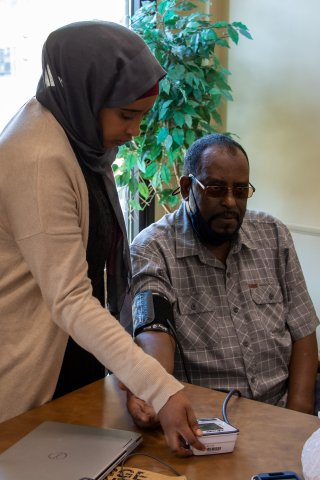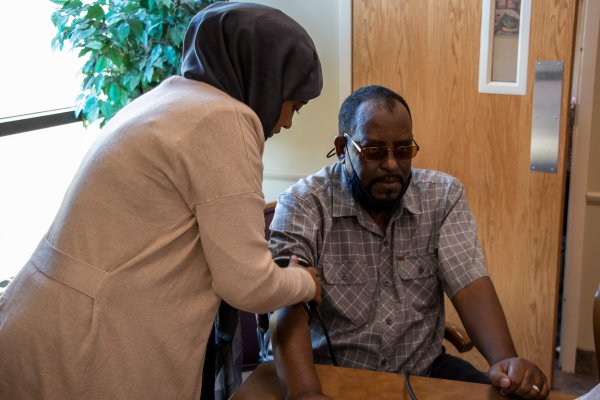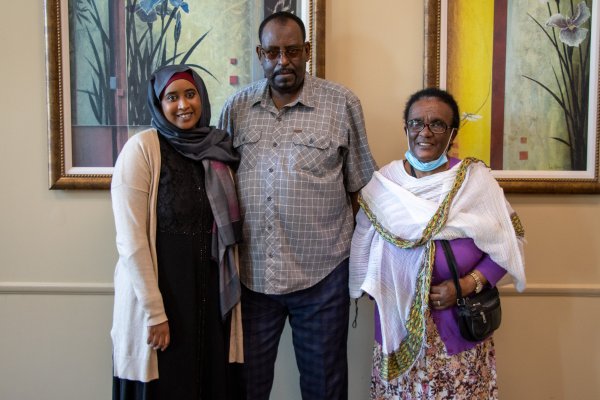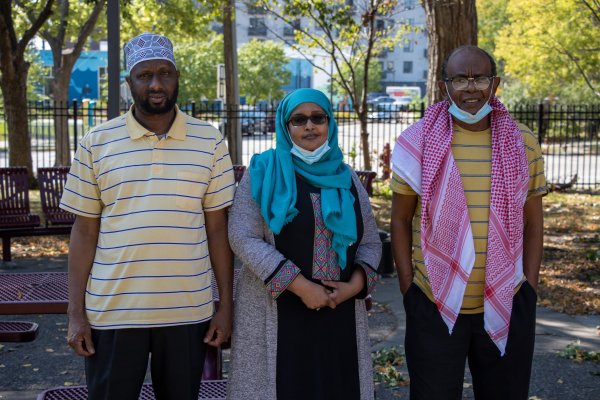Staying healthy can be a complicated proposition these days. Imagine what navigating healthcare would be like if you were an older adult coming from a different culture and with limited English.
That’s where VOA’s Community Health Workers come in. Arefat Musa and Ayane Manik help hundreds of residents in Minneapolis Public Housing Authority (MPHA) highrises monitor their personal health and navigate our healthcare systems.
One to two times a week Arefat comes to the Parker Skyview Community Room and checks blood pressures or glucose levels. She might help someone understand medical guidance they’ve received or connect them with medical professionals who speak their language. Arefat speaks five different languages which makes it easier for her to help East Africans from several different cultures. Community Health Workers also lead light exercise classes for older adults and educate people on nutrition.
Arefat has also worked with VOA’s Culturally Responsive Caregiver Support and Dementia Services and is able to identify and provide specific resources for those struggling with dementia.
Ayane, who works with residents at Heltzer Manor Highrise in south Minneapolis, notes that it can often take about six months of weekly or biweekly visits before someone she serves begins to trust her enough to share health information.
“Now, they call me – ‘Ayane, are you coming?’” she said, often hearing that message if she’s not there on her usual Monday.
When invited, Ayane might tag along on a medical appointment to learn more about how she can help her client follow doctors’ recommendations. Prescription directions on bottles can be difficult to understand for anyone, much less someone with limited English. To help, Ayane sometimes develops color codes to make it easier for people differentiate their medicines. She will sometimes draw lines on each bottle to show them how many times they need to take it; one line for once a day, two lines for twice a day and so on.
When a picture tells more about a medication or health instruction than words, Arefat prints off illustrations and photos of and hands them out to clients.
Promoting health in Minnesota's East African community has been a lifelong passion for both women. They feel fortunate to find work in the field and both hope to continue and progress in the health and human services area.
“I like to help people,” Ayane said. “I used to help my dad. He was sick for 30 years. I helped him with everything - medications, taking him to the hospital. When we came from Africa to Canada, I was with him all this time. When he passed away and I moved here, I saw that a lot of people need some help – a lot of elder people - who don’t know a lot about the culture.”
Ayane and Arefat treat clients with respect and strive to learn how they can best help each person make their own decisions about their health. This approach makes them a welcome presence.
“I enjoy it. It’s good,” Ayane’s client Salaat agrees. “I want her to check my blood pressure. Some people have medicine. Some people have communications (that Ayane can help with.) It can be confusing (but with Ayane’s help) I know what’s going on and I love it!”



